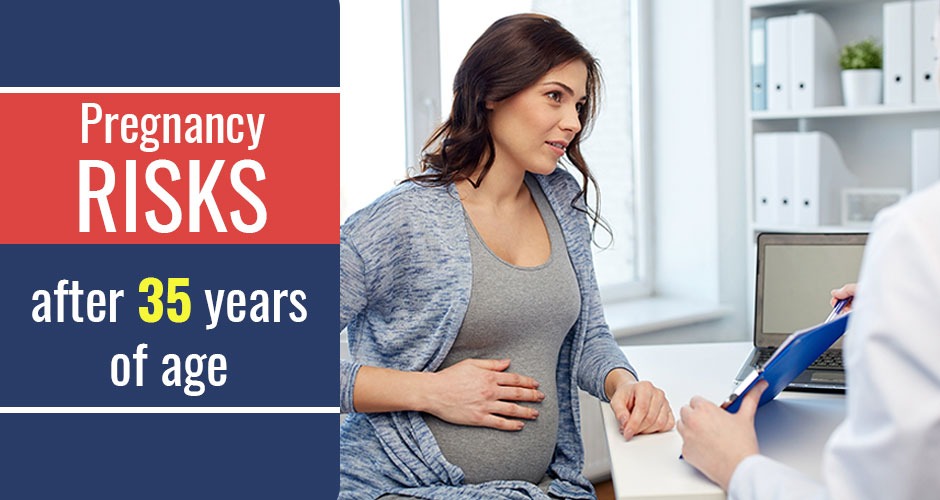The increased risk is largely due to underlying medical problems more common in older women. With age your risk of early miscarriage goes.
/what-are-your-chances-of-getting-pregnant-after-35-1959931-v1-1e5827790ff24ce4965b2a94ac00c8e3.png) Overview And Help For Getting Pregnant After 35
Overview And Help For Getting Pregnant After 35
Structural problems in the uterus or cervix can heighten the risk of difficulties like.

Pregnancy risks at 35. As an older mum you are more likely to. Some studies have indicated that there is an elevated risk of low birth weight under 25 kilograms and preterm birth before 37 weeks of pregnancy for women aged 35 or older. If your baby is born early he or she may need special care in hospital.
Experts arent totally sure why this is. However there is debate about using 35 as a cutoff age for fertility. But some become more likely when you hit 35 including.
By age 45 it is 1 in 30. One of the most well-known risks of having a baby later is the chances of certain types of fetal anomaly. These conditions can affect how well your pregnancy and birth goes.
Pregnancy risks are higher for mothers older than age 35. Yes its true. Being pregnant after age 35 makes certain complications more likely including premature birth birth defects and getting pregnant with multiples.
In particular Downs Edwards and Patau syndromes trisomies 21 18 and 13. Most miscarriages happen in the first 13 weeks of pregnancy. If youre older than 35 you may want to have prenatal screening tests to see if your baby is at risk for certain birth defects.
The likelihood of Downs syndrome continues to. Though plenty of mums over the age of 35 have healthy pregnancies you do have increased risk of ongoing health conditions such as diabetes and high blood pressure. Women older than 35 may have trouble getting pregnant.
Women over 35 are more likely to develop gestational diabetes or high blood pressure during pregnancy. If you are over 35 there is a greater risk of placental problems including placenta previa. All women are at risk for developing complications during pregnancy but some are more likely as women get older.
The chance of having a baby with Downs syndrome increases from less than one in 1000 under age 30 to one in 400 for women who become pregnant at 35. Also theres a higher chance for women in this age group to have underlying health problems such as obesity or heart disease. This would be considered a negative screening because the actual risk determined by the screening was better than your statistical risk 1.
Studies have shown that women who postpone childbearing to after 35 do face some special risks including miscarriage premature delivery and stillbirth gestational diabetes. Geriatric Pregnancy Risks Problems can arise no matter how old you are when you get pregnant. Stillbirth or losing a pregnancy after 20 weeks gestation is unfortunately also more common after 35 ACOG says.
Women ages 35 to 39 have a 75 percent increase in risk Women ages 40 and older are at 5 times the risk Weeks 6 to 12 Once a pregnancy makes it to 6 weeks and has confirmed viability with a. Smoking cigarettes drinking alcohol and using illegal drugs can put a pregnancy at risk. Health Risks Associated with Pregnancy Reproductive abnormalities.
If you are age 35 the risk increases to 1 in 400. You at 35 weeks Labour that starts before 37 weeks is considered premature. Getting Pregnant After 35 Is Not Impossible Research has demonstrated that it is often more difficultbut not impossibleto conceive naturally after a certain age.
If your baby is a boy his testicles are beginning to descend from his abdomen into his scrotum. This risk triples in women in the 40s. High blood pressure which can lead to.
At 35 your screening might say that your blood tests indicate your risk of having a child with Down syndrome is 1 in 500 for this pregnancy. Women who give birth at 35 or older have a higher risk of stillbirth and maternal death although the overall number of stillbirths and women who die in childbirth each year has dropped significantly in the United States in the last few decades. Women under age 20.
Proper diagnosis and treatment will help reduce the risks for you and. Women under the age of 20 have a significantly higher risk of serious medical complications related. Women over age 35.
